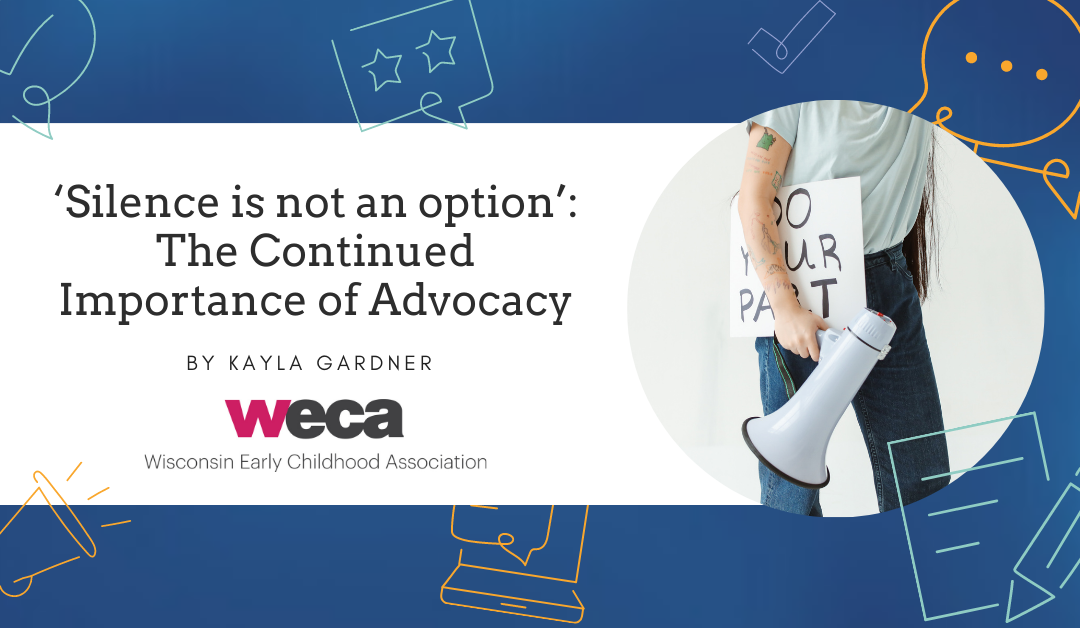Advocacy has always been a part of who I am, even when I was too young to even know what the word “advocacy” meant. Earlier this year, I got to take my passion for early childhood advocacy to a big stage – the offices of Wisconsin’s elected officials – during the National Association for the Education of Young Children (NAEYC) Public Policy Forum. As a former early childhood educator and current Wisconsin Early Childhood Association employee, this experience elevated my passion and sense of urgency for advocacy on behalf of early care and education.
Although I am no longer in the classroom, my experience as an ECE teacher was, of course, top of mind as I approached Public Policy Forum. While the event is traditionally held in-person in the nation’s capitol, it took on a virtual format again this year. Virtual delivery presents a silver lining in that it allows many new people to attend, including me. First, we had two days of sessions on topics ranging from how the federal budget works, and successes from states that have implemented innovative programs to supporting the ECE workforce and creating community in early childhood advocacy. It was energizing to be surrounded by so many people who share my passion for moving forward sustainable and high-level change in ECE.
When meeting with Wisconsin’s state team, I enjoyed meeting early childhood providers, agency staff and community leaders from around Wisconsin and learning from their experiences. It motivated me and helped create a sense of shared community as we headed into our legislative meetings.
I remember how nervous I felt when I saw the name of a Wisconsin senator show up on my work calendar. Could I really do this? They were going to hear from me? However, that fear quickly faded shortly after our meetings began. I was not alone – I was speaking among my very competent colleagues, and with providers across the state. As a group, we had a collective expertise in the needs and demands of the ECE workforce, and it was our responsibility to share it.
Advocacy is critical because we know child care is not simply a place where you set your child down and walk away. You wouldn’t entrust your child with just anyone, right? Early care and education is highly skilled work that requires an in-depth knowledge of child development, developmentally appropriate practices, social-emotional training, first aid and CPR knowledge and curriculum implementation – just to name a few skills.
The bottom line is that early childhood educators are highly skilled and knowledgeable, and they deserve to be compensated for their expertise, experience and dedication. Presently, many early childhood educators earn close to poverty-level wages, and many do not have access to benefits such as health insurance and retirement.
On the flip side, the cost of high-quality child care is simply out of reach for too many families. There is no way to increase wages for early childhood educators without significant outside investment. Additionally, we are in the midst of a significant staffing crisis, with many early childhood educators leaving the field in search of higher wages.
During my years as an infant/toddler teacher in a group child care setting, I saw and experienced many issues surrounding both the child care workforce and working families. It is quite impossible to separate the two aspects because they go hand in hand. When the pandemic began, the importance of early childhood education and care became more important – and evident to the broader public – than ever before. Many people experienced, for the first time, what it was like to lack access to the high-quality child care that allows them to continue their employment. I was an infant-toddler teacher at a group center that chose to remain open to serve the families of our essential workers. While many people seemed to agree that it was essential for us to stay open, we often felt like we were on our own.
During our legislative meetings, I noticed the staffers asking a lot of good questions. They sought to understand our work and how it impacted their constituents. To illustrate how significant investment in child care infrastructure helps both the ECE workforce AND families, I shared a first-hand example. When my child care center stayed open for essential workers, many of our families had the ability to keep their children at home to help slow the spread and keep space open for the children of essential workers. The pandemic relief funding allocated in summer 2020 allowed the owner of the program to keep all our staff employed AND offer tuition relief to all the families who were able to keep their children at home. The investment from one source had a positive ripple effect.
We also heard from family child care providers who shared their immediate needs. Many of them joined these advocacy meetings from their homes while caring for children. This illustrates the sheer lack of personnel in the child care workforce right now when compared to the overwhelming need. I commend providers for taking the time to meet with lawmakers when their daily work is quite demanding.
My first advocacy experience made me realize participating in an event like the Public Policy Forum and engaging with lawmakers is much easier – and much less intimidating – than I thought. With preparation and strong stories to share, anyone can do it, and a variety of collective voices gives our elected leaders the critical perspective they need to make informed policy decisions.
Silence is not an option – because silence can signal there is not great need for transformative change. Continued and concerted advocacy is critical to support much-needed investment in the current and future ECE landscape in Wisconsin and the country. Our influential voices bring that possibility to life.

